英语分词语法语态重点
- 格式:docx
- 大小:13.51 KB
- 文档页数:2
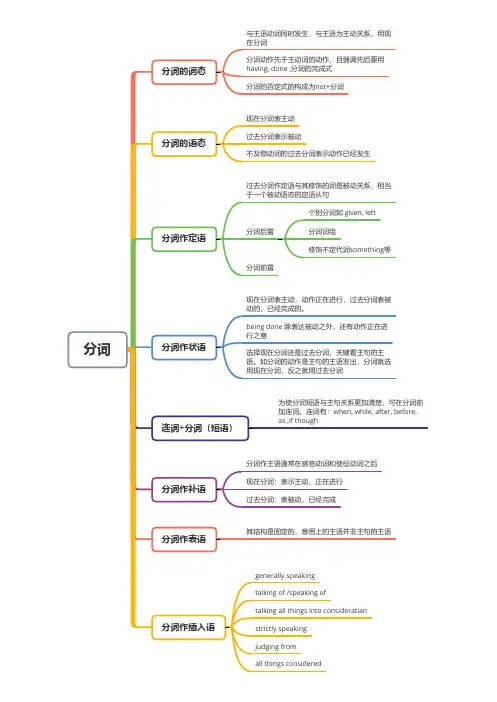
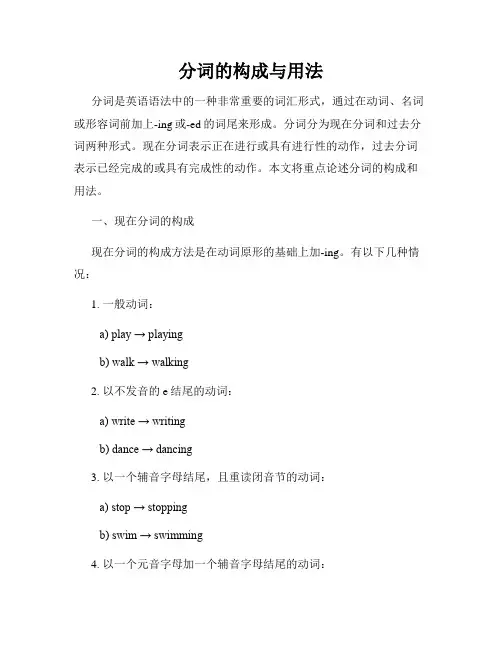
分词的构成与用法分词是英语语法中的一种非常重要的词汇形式,通过在动词、名词或形容词前加上-ing或-ed的词尾来形成。
分词分为现在分词和过去分词两种形式。
现在分词表示正在进行或具有进行性的动作,过去分词表示已经完成的或具有完成性的动作。
本文将重点论述分词的构成和用法。
一、现在分词的构成现在分词的构成方法是在动词原形的基础上加-ing。
有以下几种情况:1. 一般动词:a) play → playingb) walk → walking2. 以不发音的e结尾的动词:a) write → writingb) dance → dancing3. 以一个辅音字母结尾,且重读闭音节的动词:a) stop → stoppingb) swim → swimming4. 以一个元音字母加一个辅音字母结尾的动词:a) chat → chattingb) run → running5. 以-ie结尾的动词,变-ie为-y,再加-ing:a) lie → lyingb) die → dying二、现在分词的用法现在分词作为形容词使用,用以修饰名词或代词。
其用法有以下几个方面:1. 表示主动:a) The running boy is my brother.(主动)b) The interesting book caught my attention.(主动)2. 表示被动:a) The broken window needs to be repaired.(被动)b) The fallen leaves covered the ground.(被动)3. 表示原因:a) He couldn't sleep because of the barking dog.(原因)b) I was late for work due to the heavy traffic.(原因)4. 表示方式:a) She stood up, raising her hand.(方式)b) They spent the weekend playing games.(方式)5. 修饰名词:a) The smiling child greeted us at the door.(修饰名词)b) The running water sounded so peaceful.(修饰名词)三、过去分词的构成过去分词的构成方法有以下几种情况:1. 一般动词:a) play → playedb) walk → walked2. 以不发音的e结尾的动词:a) write → writtenb) dance → danced3. 以一个重读闭音节结尾的动词,且末尾只有一个辅音字母时,需双写该辅音字母再加-ed:a) stop → stoppedb) swim → swum4. 以一个重读闭音节结尾的动词,末尾有两个以上的辅音字母时,直接加-ed:a) chat → chattedb) run → run5. 以-ie结尾的动词,变-ie为-y,再加-ed:a) lie → liedb) die → died四、过去分词的用法过去分词常用于被动语态、完成时态或作为形容词使用。
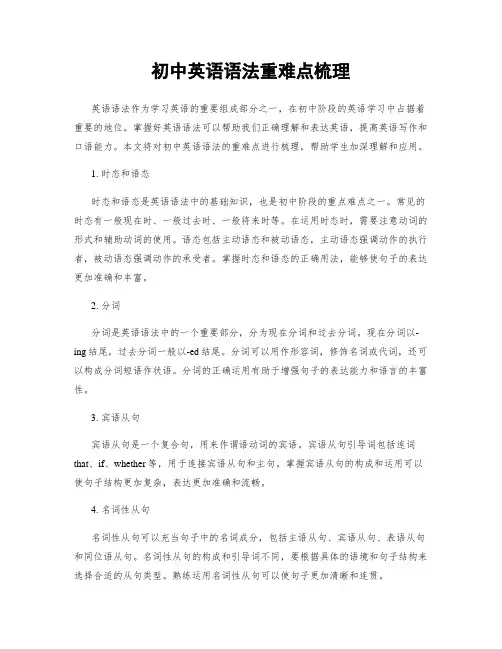
初中英语语法重难点梳理英语语法作为学习英语的重要组成部分之一,在初中阶段的英语学习中占据着重要的地位。
掌握好英语语法可以帮助我们正确理解和表达英语,提高英语写作和口语能力。
本文将对初中英语语法的重难点进行梳理,帮助学生加深理解和应用。
1. 时态和语态时态和语态是英语语法中的基础知识,也是初中阶段的重点难点之一。
常见的时态有一般现在时、一般过去时、一般将来时等。
在运用时态时,需要注意动词的形式和辅助动词的使用。
语态包括主动语态和被动语态,主动语态强调动作的执行者,被动语态强调动作的承受者。
掌握时态和语态的正确用法,能够使句子的表达更加准确和丰富。
2. 分词分词是英语语法中的一个重要部分,分为现在分词和过去分词。
现在分词以-ing结尾,过去分词一般以-ed结尾。
分词可以用作形容词,修饰名词或代词,还可以构成分词短语作状语。
分词的正确运用有助于增强句子的表达能力和语言的丰富性。
3. 宾语从句宾语从句是一个复合句,用来作谓语动词的宾语。
宾语从句引导词包括连词that、if、whether等,用于连接宾语从句和主句。
掌握宾语从句的构成和运用可以使句子结构更加复杂,表达更加准确和流畅。
4. 名词性从句名词性从句可以充当句子中的名词成分,包括主语从句、宾语从句、表语从句和同位语从句。
名词性从句的构成和引导词不同,要根据具体的语境和句子结构来选择合适的从句类型。
熟练运用名词性从句可以使句子更加清晰和连贯。
5. 比较级和最高级比较级和最高级是表示程度、大小和数量的形式之一。
比较级用于两个人或事物之间的比较,最高级表示三个或三个以上人或事物之间的比较。
比较级的构成和比较级形容词的变化规则需要掌握,同时要注意比较级的用法,包括比较级与连词than的搭配以及比较级的句式结构。
6. 介词短语介词短语通常由介词和跟在后面的名词、代词构成,用来修饰其他的词或短语。
介词短语在句子中可以表示位置、时间、方式、原因等。
熟练掌握常用的介词和介词短语的用法,能够帮助我们准确表达自己的意思。
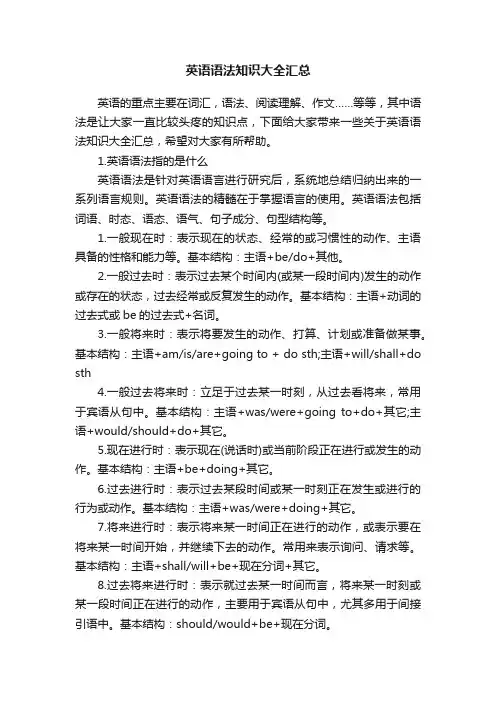
英语语法知识大全汇总英语的重点主要在词汇,语法、阅读理解、作文……等等,其中语法是让大家一直比较头疼的知识点,下面给大家带来一些关于英语语法知识大全汇总,希望对大家有所帮助。
1.英语语法指的是什么英语语法是针对英语语言进行研究后,系统地总结归纳出来的一系列语言规则。
英语语法的精髓在于掌握语言的使用。
英语语法包括词语、时态、语态、语气、句子成分、句型结构等。
1.一般现在时:表示现在的状态、经常的或习惯性的动作、主语具备的性格和能力等。
基本结构:主语+be/do+其他。
2.一般过去时:表示过去某个时间内(或某一段时间内)发生的动作或存在的状态,过去经常或反复发生的动作。
基本结构:主语+动词的过去式或be的过去式+名词。
3.一般将来时:表示将要发生的动作、打算、计划或准备做某事。
基本结构:主语+am/is/are+going to + do sth;主语+will/shall+do sth4.一般过去将来时:立足于过去某一时刻,从过去看将来,常用于宾语从句中。
基本结构:主语+was/were+going to+do+其它;主语+would/should+do+其它。
5.现在进行时:表示现在(说话时)或当前阶段正在进行或发生的动作。
基本结构:主语+be+doing+其它。
6.过去进行时:表示过去某段时间或某一时刻正在发生或进行的行为或动作。
基本结构:主语+was/were+doing+其它。
7.将来进行时:表示将来某一时间正在进行的动作,或表示要在将来某一时间开始,并继续下去的动作。
常用来表示询问、请求等。
基本结构:主语+shall/will+be+现在分词+其它。
8.过去将来进行时:表示就过去某一时间而言,将来某一时刻或某一段时间正在进行的动作,主要用于宾语从句中,尤其多用于间接引语中。
基本结构:should/would+be+现在分词。
9.现在完成时:过去发生或已经完成的动作对现在造成的影响或结果,或从过去已经开始,持续到现在的动作或状态。
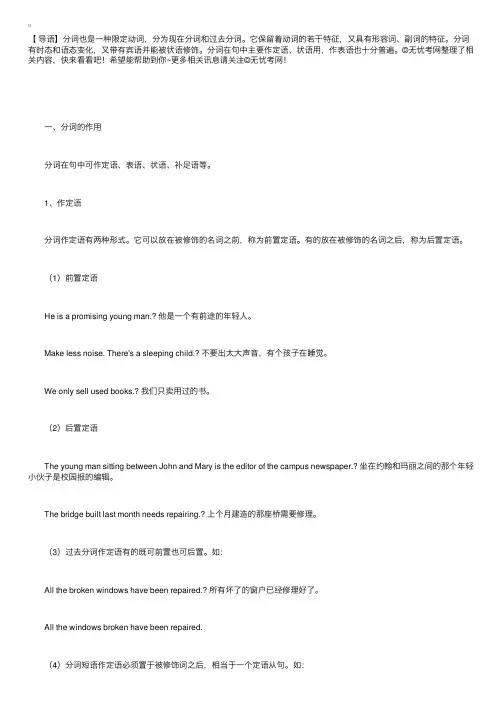
【导语】分词也是⼀种限定动词,分为现在分词和过去分词。
它保留着动词的若⼲特征,⼜具有形容词、副词的特征。
分词有时态和语态变化,⼜带有宾语并能被状语修饰。
分词在句中主要作定语、状语⽤,作表语也⼗分普遍。
©⽆忧考⽹整理了相关内容,快来看看吧!希望能帮助到你~更多相关讯息请关注©⽆忧考⽹! ⼀、分词的作⽤ 分词在句中可作定语、表语、状语、补⾜语等。
1、作定语 分词作定语有两种形式。
它可以放在被修饰的名词之前,称为前置定语。
有的放在被修饰的名词之后,称为后置定语。
(1)前置定语 He is a promising young man.? 他是⼀个有前途的年轻⼈。
Make less noise. There's a sleeping child.? 不要出太⼤声⾳,有个孩⼦在睡觉。
We only sell used books.? 我们只卖⽤过的书。
(2)后置定语 The young man sitting between John and Mary is the editor of the campus newspaper.? 坐在约翰和玛丽之间的那个年轻⼩伙⼦是校园报的编辑。
The bridge built last month needs repairing.? 上个⽉建造的那座桥需要修理。
(3)过去分词作定语有的既可前置也可后置。
如: All the broken windows have been repaired.? 所有坏了的窗户已经修理好了。
All the windows broken have been repaired. (4)分词短语作定语必须置于被修饰词之后,相当于⼀个定语从句。
如: Those wishing to join this club should sign here.? 想加⼊本俱乐部的⼈在这⾥签名。
? (=Those who wish to join the club should sign here.) The man, having been disturbed so badly, almost lost his memory.? 由于被严重困扰,这个⼈⼏乎失去了记忆。
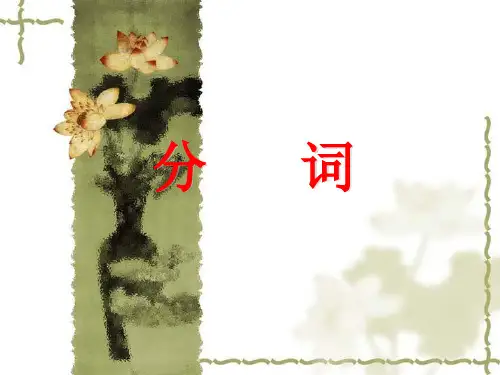
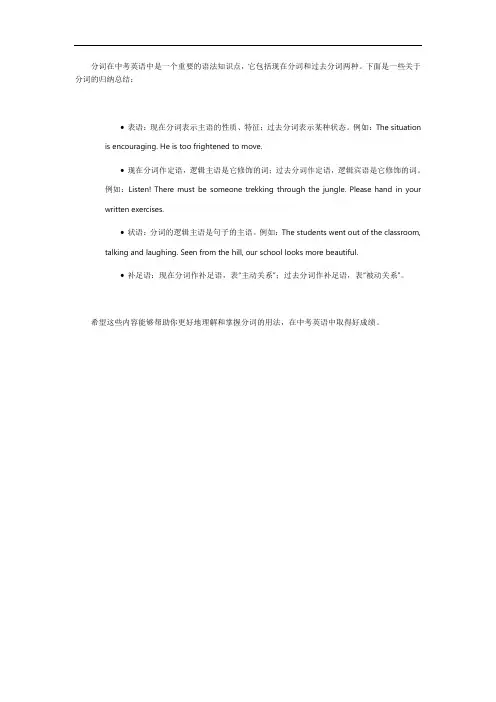
分词在中考英语中是一个重要的语法知识点,它包括现在分词和过去分词两种。
下面是一些关于分词的归纳总结:
•表语:现在分词表示主语的性质、特征;过去分词表示某种状态。
例如:The situation is encouraging. He is too frightened to move.
•现在分词作定语,逻辑主语是它修饰的词;过去分词作定语,逻辑宾语是它修饰的词。
例如:Listen! There must be someone trekking through the jungle. Please hand in your written exercises.
•状语:分词的逻辑主语是句子的主语。
例如:The students went out of the classroom, talking and laughing. Seen from the hill, our school looks more beautiful.
•补足语:现在分词作补足语,表“主动关系”;过去分词作补足语,表“被动关系”。
希望这些内容能够帮助你更好地理解和掌握分词的用法,在中考英语中取得好成绩。
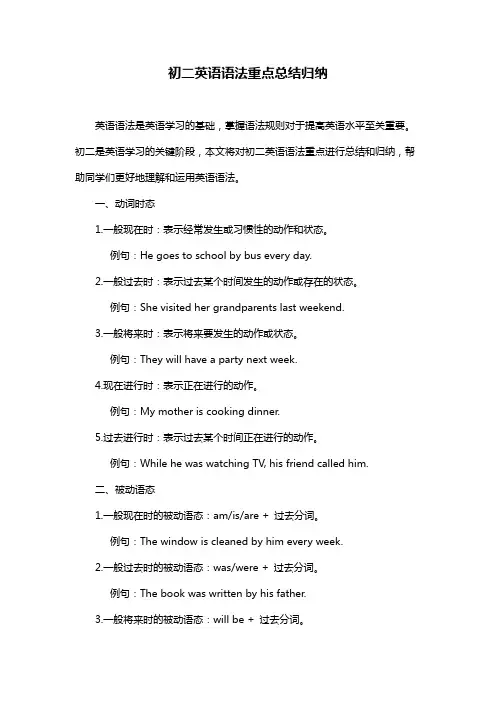
初二英语语法重点总结归纳英语语法是英语学习的基础,掌握语法规则对于提高英语水平至关重要。
初二是英语学习的关键阶段,本文将对初二英语语法重点进行总结和归纳,帮助同学们更好地理解和运用英语语法。
一、动词时态1.一般现在时:表示经常发生或习惯性的动作和状态。
例句:He goes to school by bus every day.2.一般过去时:表示过去某个时间发生的动作或存在的状态。
例句:She visited her grandparents last weekend.3.一般将来时:表示将来要发生的动作或状态。
例句:They will have a party next week.4.现在进行时:表示正在进行的动作。
例句:My mother is cooking dinner.5.过去进行时:表示过去某个时间正在进行的动作。
例句:While he was watching TV, his friend called him.二、被动语态1.一般现在时的被动语态:am/is/are + 过去分词。
例句:The window is cleaned by him every week.2.一般过去时的被动语态:was/were + 过去分词。
例句:The book was written by his father.3.一般将来时的被动语态:will be + 过去分词。
例句:A new school will be built in our community next year.三、情态动词1.can/may:表示能力、请求或可能性。
例句:He can speak English fluently./ You may go out now.2.must:表示必须、一定。
例句:You must study hard for the exam.3.should:表示应该、建议。
例句:You should eat more vegetables.四、名词性从句1.主语从句:从句在句子中作主语。
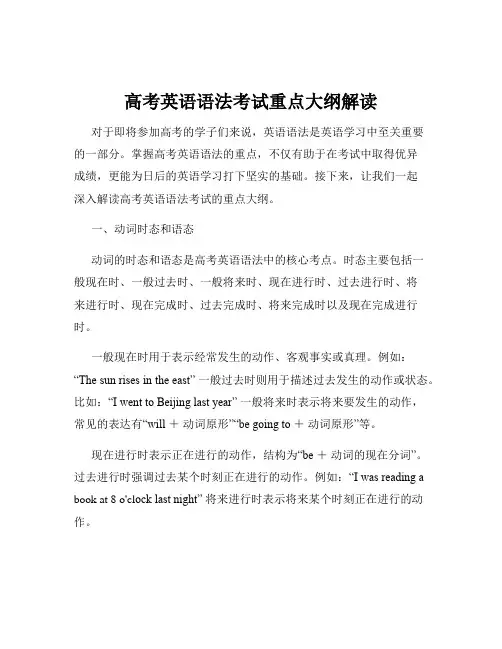
高考英语语法考试重点大纲解读对于即将参加高考的学子们来说,英语语法是英语学习中至关重要的一部分。
掌握高考英语语法的重点,不仅有助于在考试中取得优异成绩,更能为日后的英语学习打下坚实的基础。
接下来,让我们一起深入解读高考英语语法考试的重点大纲。
一、动词时态和语态动词的时态和语态是高考英语语法中的核心考点。
时态主要包括一般现在时、一般过去时、一般将来时、现在进行时、过去进行时、将来进行时、现在完成时、过去完成时、将来完成时以及现在完成进行时。
一般现在时用于表示经常发生的动作、客观事实或真理。
例如:“The sun rises in the east” 一般过去时则用于描述过去发生的动作或状态。
比如:“I went to Beijing last year” 一般将来时表示将来要发生的动作,常见的表达有“will +动词原形”“be going to +动词原形”等。
现在进行时表示正在进行的动作,结构为“be +动词的现在分词”。
过去进行时强调过去某个时刻正在进行的动作。
例如:“I was reading a book at 8 o'cl ock last night” 将来进行时表示将来某个时刻正在进行的动作。
现在完成时表示过去发生的动作对现在造成的影响或结果,或者从过去开始一直持续到现在的动作。
其结构为“have/has +过去分词”。
过去完成时则以过去某个时间为基准,表示过去的过去所发生的动作。
语态方面,分为主动语态和被动语态。
被动语态的构成是“be +过去分词”,需要根据时态和主语的单复数来确定具体形式。
二、非谓语动词非谓语动词包括动词不定式、动名词和分词(现在分词和过去分词)。
动词不定式具有名词、形容词和副词的特征,可在句中作主语、宾语、定语、状语等。
例如:“To learn English well is not easy” (作主语)“I want to go shopping” (作宾语)动名词具有名词的特征,可作主语、宾语、定语等。
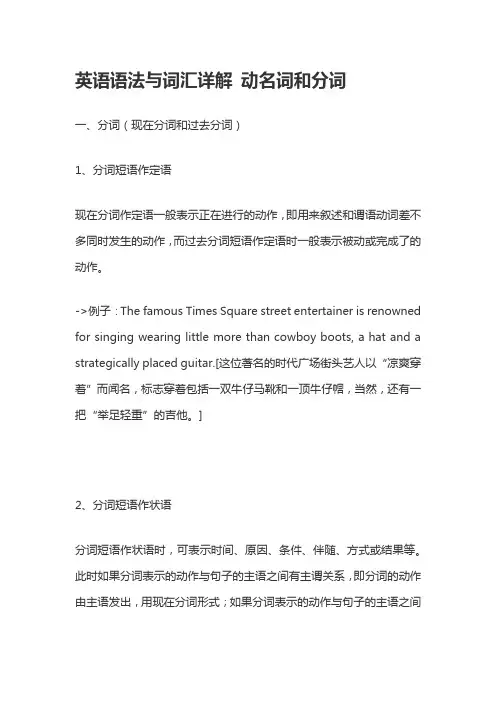
英语语法与词汇详解动名词和分词一、分词(现在分词和过去分词)1、分词短语作定语现在分词作定语一般表示正在进行的动作,即用来叙述和谓语动词差不多同时发生的动作,而过去分词短语作定语时一般表示被动或完成了的动作。
->例子:The famous Times Square street entertainer is renowned for singing wearing little more than cowboy boots, a hat and a strategically placed guitar.[这位著名的时代广场街头艺人以“凉爽穿着”而闻名,标志穿着包括一双牛仔马靴和一顶牛仔帽,当然,还有一把“举足轻重”的吉他。
]2、分词短语作状语分词短语作状语时,可表示时间、原因、条件、伴随、方式或结果等。
此时如果分词表示的动作与句子的主语之间有主谓关系,即分词的动作由主语发出,用现在分词形式;如果分词表示的动作与句子的主语之间有动宾关系,即句子的主语是分词动作的承受者,分词采用过去分词形式。
->例子:People can even get a computer by which to control the contraption, making the teeth change colors or even blink.[人们还可通过电脑远程控制该装置,使得牙齿变色甚至不断闪烁。
]3、带连词的分词短语作状语分词短语可用在after, before, when, while, when, ever, once,until, if, as if等之后。
->例子:French skyscraper climber Alain Robert scaled a 31-floor office building outside Paris on Wednesday using only his bare hands, his last climb before spending a weekin prison in Texas.[本周三,法国摩天大楼攀登高手阿兰·罗伯特徒手爬上位于巴黎近郊一幢31层的办公大楼。
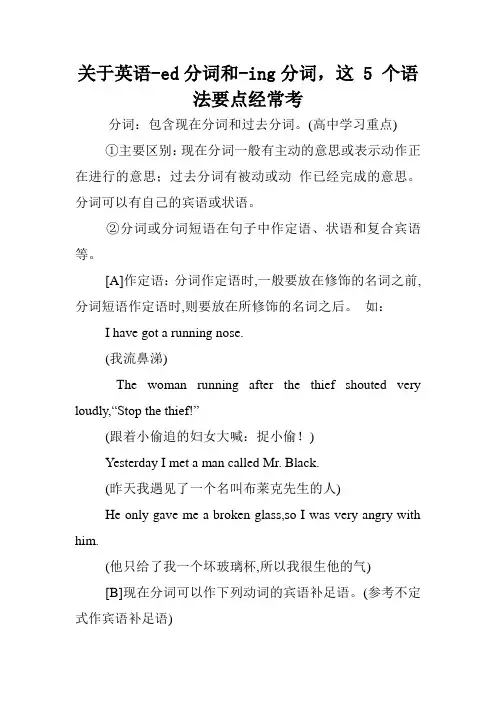
关于英语-ed分词和-ing分词,这 5 个语法要点经常考分词:包含现在分词和过去分词。
(高中学习重点)①主要区别:现在分词一般有主动的意思或表示动作正在进行的意思;过去分词有被动或动作已经完成的意思。
分词可以有自己的宾语或状语。
②分词或分词短语在句子中作定语、状语和复合宾语等。
[A]作定语:分词作定语时,一般要放在修饰的名词之前,分词短语作定语时,则要放在所修饰的名词之后。
如:I have got a running nose.(我流鼻涕)The woman running after the thief shouted very loudly,“Stop the thief!”(跟着小偷追的妇女大喊:捉小偷!)Yesterday I met a man called Mr. Black.(昨天我遇见了一个名叫布莱克先生的人)He only gave me a broken glass,so I was very angry with him.(他只给了我一个坏玻璃杯,所以我很生他的气)[B]现在分词可以作下列动词的宾语补足语。
(参考不定式作宾语补足语)谓语动词(vt.)宾语宾语补足语keep(保持) /see(看到) /hear(听到) /watch(注意到) /feel(感觉到)sb./sth.(do)ing如:Mum kept me working all the week.(妈妈让我一个星期都在工作)When I entered the room,I saw Jack eating a big pear.(我进入房间时看到杰克正在吃一只大梨子)In the dark I felt something very cold moving on my foot.(黑暗之中我感到有个冷的东西在我的脚上移动)[C]现在分词可以作状语,表示伴随情况。
如:She came into the classroom,holding a pile of papers in her hand.(他走进教室,手上抓着一沓纸)I am very busy these days getting ready for the coming oral test.(这些日子我正忙着准备即将来到的口语考试)[D]过去分词可以作表语,放在连系动词后面,但要注意不要与被动语态混淆,“主系表”主要表示状态,而被动语态则表示动作。
2019考研英语语法小讲:分词的时态和语态过去分词能够表示“被动”和“完成”等意义,所以没有时态和语态方面的形式变化。
下面谈一下现在分词的时态和语态。
1.现在分词的完成式(having+过去分词)表示的动作发生在谓语动词所表示的动作之前或两个动作在时间上有一定的间隔。
例如:Having written the letter,John went to the post office.(=After he had written the letter,John went to the post office.约翰写完信后,就去邮局了。
Having lived in Beijing for years,Lao Wang knows the city quite well.(=As he has lived in Beijing for years,Lao Wang knows the city quite well.)老王在北京住了多年,所以对这个城市很熟悉。
Having drunk two glasses of water, Xiao Ma felt a little better.(=After he had drunk two glasses of water Xiao Ma felt a little better.)小马喝了两杯水,感觉好一些了一般式和完成式现在分词都能够表示先后接连发生的动作。
在可能引起误解的场合应该用完成式现在分词表示先发生的动作。
例如:Opening the drawer,he took out his wallet.(=He opened the drawer and took out his wallet.)他打开抽屉,拿出钱包。
Coming into the room,he put down his bag.(=he came into the room and put down his bag.)他走进房间,放下提包。
英语语法总结:非谓语动词之分词1.分词的性质:具有形容词性质,可以在句中担任表语、定语、宾补、状语,现在分词表示主动,且动作在进行:过去分词表示被动,或动作已完成。
2.分词的形式:例:write (vt) rise (vi)主动语态被动语态主动过去分词时态现在时writing beingwritten rising risen完成时having written having beenwritten having risen3.用法:(1)定语分词置于被修饰名词前分词短语于置于被修饰名词后a sleeping baby = a baby who is sleepinga running dog = a dog which is runninga broken glass = a glass which is brokena beaten team = a team which is beaten(beaten 是被打败的意思)(2)表语:The book is interesting.He is interested in the book.The news is exciting.He feels excited.(3)宾语补足语:When I woke up, I found my mother sitting besideme.I'd like to have this package weighed.掌握精髓:动词不定式作宾语表示动作的全过程,而现在分词作宾补表示动作正在进行;过去分词表示被动概念。
(4)状语:(以下例句值得一背!)①If you turn to the left, you'll find the station.→Turning to the left, you'll find the station.②As I didn't receive her letter, I called her up by telephone.→Not receiving her letter, I called her up by telephone.③While I was walking to school yesterday morning, I met a friend.→Walking to school yesterday morning, I met a friend.④When she was asked it she had any bad habit, she answered that she was a heavy smoker.→Asked if she had any bad habit, she answered that she was a heavy smoker.你知道吗?注意:在运用此类句型时主语前后要保持一致。
英语语法重点知识大汇总英语语法重点知识大汇总一、动词时态动词时态是英语语法中最重要的部分之一。
它用来表达动作发生的时间和方式。
以下是几种常见的动词时态:1、现在时态:表示现在的动作或状态。
例如:I am studying English.2、过去时态:表示过去的动作或状态。
例如:She was happy yesterday.3、将来时态:表示将来的动作或状态。
例如:They will travel to Paris next week.二、名词名词用来表示人、物或抽象概念。
以下是几个需要注意的名词语法点:1、可数名词与不可数名词:可数名词是可以一个一个计算的名词,例如:dog;不可数名词是无法一个一个计算的名词,例如:water。
2、名词所有格:表示所有关系的一种语法形式,例如:my book,their house。
三、形容词形容词用来描述人或物的特征。
以下是几个需要注意的形容词语法点:1、比较级和最高级:比较级表示“更……”的意思,最高级表示“最……”的意思。
例如:better,best。
2、形容词的位置:形容词一般放在名词前面,如:beautiful flower;但有时候也可以放在名词后面,如:flower beautiful。
四、副词副词用来描述动作或状态的特征。
以下是几个需要注意的副词语法点:1、副词的位置:副词一般放在动词前面,如:quickly run;但有时候也可以放在动词后面,如:run quickly。
2、副词的比较级和最高级:副词也有比较级和最高级,例如:faster,fastest。
五、从句从句是句子中的一个组成部分,它可以是一个完整的句子,也可以是一个短语或单词。
以下是几种常见的从句类型:1、名词性从句:用来代替名词的一种从句,例如:what he said is not important。
2、定语从句:用来修饰名词的一种从句,例如:the girl who is singing is my friend。
英语分词语法语态重点
I.要点
分词既具有动词的一些特征,又具有形容和副词的句法功能。
它分为现在分词和过去分词两类。
现在分词和过去分词的主要差别在于现在分词有一般式和完成式,过去分词则只有一般式。
现在分词表动作正在进行,表主动。
过去分词及物动词表动作已经完成,表被动。
过去分词不及物动词表动作已经完成,表主动。
过去分词的句法功能:
1、作定语
I like to read the novel written by Lu Xun.
The woman sitting beside the broken window was a friend of mine.
2、作表语
When I came into the room, I found the window was broken.
I'm interested in this book.
3、作宾语补足语
I'm going to have my bike repaired.
When I walked home, I saw the thief caught by the police.
4、作状语
Seen from the top of the mountain, the city looks small.
The teacher came into the classroom, followed by his students.
现在分词的句法功能。
1、作状语
Seeing from the top of the mountain, I found the city was beautiful.
Walking along the street, they suddenly saw him.
2、作宾语
I hate being spoken ill of.
He considered visiting Japan during the winter vocation.
3、作表语
Seeing is believing.
The book is interesting.
4、作宾语补足语
I noticed him crossing the street.
Mother caught him smoking in the kitchen.
5、作定语
Do you know the man writing a letter?
The worker running a machine is my brother.
分词使用中的几个问题
1、现在分词的完成式
Having cleaned the room, I went out.
2、现在分词的否定式
Not having received any letter, he felt a little worried.
3、现在分词与过去分词的不同
现在分词表示主动、正在,过去分词表示被动、完成
I found the man killed there.
I found the man standing there.
4、have结构
We have the car repaired.
We have repaired the car.
We have Tom repair the car.
We have Tom repairing the car the whole morning.
5、分词作表语
We were excited at the news.
The football game is exciting.
6、独立主格结构
It being a fine day, we went out to visit the park.
II.例题
例1、Time_______,I'll go on a picnic with you.
A. permit
B. to permit
C. permitted
D. permitting
解析:该题答案为D。
Time permitting…是独立主格结构,意为"如果时间允许的话…"
例2、_______ if he had any bad habit, she replied that he was a heavy smoker.
A. Ask
B. To ask
C. Asked
D. Asking
解析:该题答案为C。
主语she是被问。